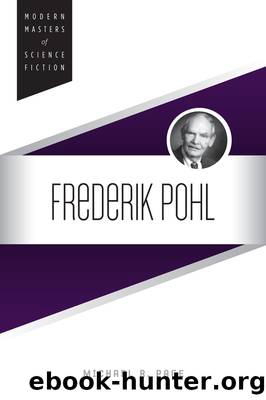Frederik Pohl by Michael R Page

Author:Michael R Page
Language: eng
Format: epub
Publisher: University of Illinois Press
Published: 2015-01-15T00:00:00+00:00
THE BOY WHO WOULD LIVE FOREVER, 1988â2013
Chernobyl and The Annals of the Heechee mark a transition in Pohlâs career. The books that follow focus less on the Cold War and more on new, pressing issues facing the contemporary world. For instance, The Voices of Heaven (1994) takes on religious zealotry, a rising phenomenon that was becoming increasingly problematic in the 1990s. Homegoing (1989) considers the environmental crisis; published two years prior to Our Angry Earth, Pohlâs nonfiction environmental alarm written with Isaac Asimov, the novel informs the reader on the ecological problems facing the planet. Outnumbering the Dead (1990) addresses issues of aging and death, something that, as Pohl turned seventy years old and as many of his contemporaries were passing, was undoubtedly on his mind. Pohl also continued to write fiction that engaged with currently topical scientific developments, such as Mining the Oort (1992), where he posits a method for making Mars habitable. But after the intense realism of Chernobyl, Pohlâs next novel, Narabedla Ltd., was a work of lighthearted fun that demonstrated his love of music and also played with Betty Hullâs background in dramatic literature. Indeed, Hull has said that it is her favorite novel among her husbandâs works, written to amuse himself as much as it was to cheer her up after her heart attack kept them from being able to attend the Lyric Opera in Chicago, for which they had main-floor seats.1
The basic premise of Narabedla Ltd. is that human artists and entertainers are shanghaied by aliens to perform for the Galactics, a conglomerate of advanced civilizations spread throughout the galaxy. The Galactics are not particularly interested in inviting humans into membership with the greater galactic civilization, because humans donât have anything to offer beyond the performing arts, but the Galactics do enjoy human entertainmentâhence the colony of abductees. The task of Nolly Stennis, a failed singer, is to convince the Galactics that humans have more to offer than mere entertainment, and, inevitably, by the end of the novel humans are invited to join Galactic civilization. The novel follows Stennis as he makes his way through the nightclubs of the greater galaxy, affording Pohl opportunities to satirize the entertainment industry. The most compelling idea that Pohl plays with is that Earth is not that important: there has been no contact, beyond snatching a few entertainers, because the Galactics simply have no interest in Earth. While this is a good joke in SF, it is also a serious supposition for explaining the Great Silenceâwhy we have had no apparent contact from the stars. Pohl utilizes the first-person narrative he consistently excels at. According to Hull, âHe wanted to show off a lot of the stuff heâd learned about stagecraft and dramaturgy and what happens behind the scenes to people who perform in public.â2 Although the novel is entertaining and reveals Pohlâs interest in the other arts in greater depth, it lacks some of the pungent criticism generally found in his work. Consequently, it is one of his happier comedies of galactic manners.
Download
This site does not store any files on its server. We only index and link to content provided by other sites. Please contact the content providers to delete copyright contents if any and email us, we'll remove relevant links or contents immediately.
The Power of Myth by Joseph Campbell & Bill Moyers(1068)
A Social History of the Media by Peter Burke & Peter Burke(988)
Half Moon Bay by Jonathan Kellerman & Jesse Kellerman(987)
Inseparable by Emma Donoghue(983)
The Nets of Modernism: Henry James, Virginia Woolf, James Joyce, and Sigmund Freud by Maud Ellmann(913)
The Spike by Mark Humphries;(812)
The Complete Correspondence 1928-1940 by Theodor W. Adorno & Walter Benjamin(789)
A Theory of Narrative Drawing by Simon Grennan(783)
Culture by Terry Eagleton(776)
Ideology by Eagleton Terry;(743)
World Philology by(719)
Farnsworth's Classical English Rhetoric by Ward Farnsworth(715)
Game of Thrones and Philosophy by William Irwin(712)
Bodies from the Library 3 by Tony Medawar(709)
High Albania by M. Edith Durham(705)
Adam Smith by Jonathan Conlin(695)
A Reader’s Companion to J. D. Salinger’s The Catcher in the Rye by Peter Beidler(689)
Monkey King by Wu Cheng'en(654)
Comic Genius: Portraits of Funny People by(652)
